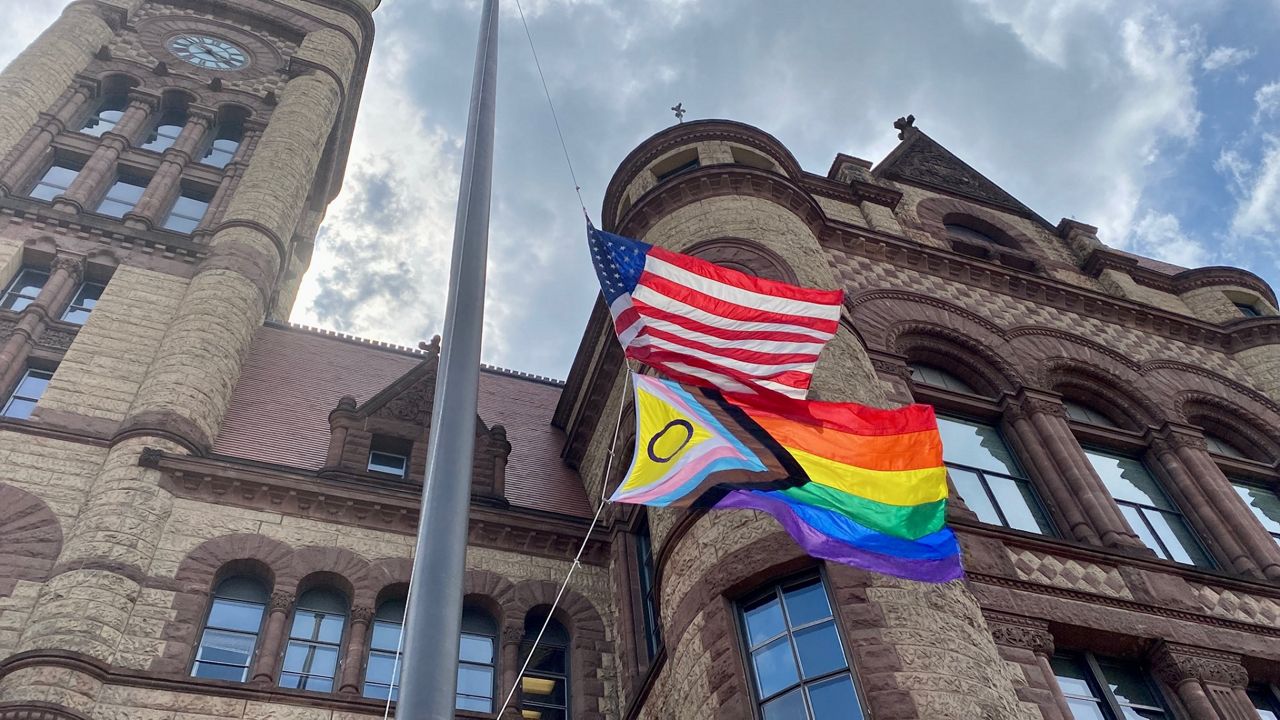CINCINNATI — City officials passed an ordinance Wednesday that they say modernizes Cincinnati’s nondiscrimination laws and makes them more inclusive.
What You Need To Know
- The city of Cincinnati modernized its nondiscrimination laws related to housing and employment to make them more inclusive
- The update clarifies wording related to legal protections based on a person’s sexual orientation, gender identity and expression.
- It also adds additional protected groups like military status, families, and pregnant and breastfeeding people.
- City Council member Reggie Harris said the goal was to highlight that Cincinnati is a “welcoming, inclusive” city in light of what feels are anti-LGBTQ laws making their way through the statehouse
The update clarifies wording related to legal protections based on a person’s sexual orientation, gender identity and expression. It also adds additional protected groups like military status, families, and pregnant and breastfeeding people.
Cincinnati City Council first passed its “Unlawful Discriminatory Practices” ordinance several years ago. It was among the first cities nationwide to adopt a law to protect residents from various types of workplace or housing discrimination.
Over time, the city has added or changed elements of the law to adapt to current needs. The most recent amendment in early 2020 added “natural hair types associated with race.”
Council Member Reggie Harris, who co-sponsored the updated legislation, said the latest update was needed to better reflect the “social values” of the city.
Among the changes are the addition of wording clarifying that “gender identity and gender expression” are protected classes.
As previously written, the law included protections for transgender people under “sexual orientation or transgender status.” The changes spell out more specific and culturally appropriate language, phrasing it as “sex, which includes without limitation sexual orientation and gender identity or expression.”
“We’ve all seen stories of mothers being asked to cover up while feeding their child. And for me, this could not come at a better time when we are suffering from a lack of formula,” said Council Member Victoria Parks, the legislation's co-sponsor. “Mothers should be able to nurse in public without shame or harassment.”
Parks described Mayor Aftab Pureval and the City Council as being “pretty common sense” and feels the proposed changes will increase equity in Cincinnati.
At a press conference announcing the plan Monday, five of City Council’s nine members appeared to show support for the legislation. Pureval and community groups — a progressive religious organization and Equality Ohio — were there as well.
A council committee recommended approval Tuesday, and the full City Council made a final decision Wednesday.
The updated phrasing stresses that courts and legislative bodies throughout the United States have worked to refine anti-discrimination terminology and expand the classes of people who receive protection.
“Cincinnati has long fought to protect LGBTQ people, but the city was actually such a leader and early adopter of these provisions, that it was time to revisit them, update the language and add a few more protected classes,” said Alana Jochum, Equality Ohio's executive director.
Jochum’s organization has tried to pass a statewide law for about a decade, but the State Legislature hasn’t approved the Ohio Fairness Act.
“Right now, your protections depend on your zip code," Jochum said. "And right now, Cincinnati has decided it wants to be among the most inclusive cities possible in this regard."
Other changes to Chapter 914 of Cincinnati’s Municipal Code affect employers, organizations and housing providers.
Currently, affected organizations must have at least 10 employees to be subject to the nondiscrimination code, but the updates passed Wednesday decrease that number to four, which aligns with Ohio’s nondiscrimination laws.
The ordinance also changes the threshold to trigger housing protections, removing the previous minimum requiring a building to have at least four units before the nondiscrimination ordinance would apply.
The new ordinance also narrows religious exemptions for employment, bringing the city into alignment with state law. The new wording reads:
“[T]his chapter does not apply to a religious corporation, association, educational institution, or society with respect to the employment of an individual of a particular religion to perform work connected with the carrying on by that religious corporation, association, educational institution, or society of its activities.”
Previously, the city law didn’t consider religious organizations a “place of public accommodation.” The new ordinance updates the language to match the determination standard under state and federal law.
“If you have an event or a space that is open to everyone, that is not exclusive to your membership, then that space and that event (must comply with) the nondiscrimination ordinance,” Harris said.
This element is similar to Ohio’s nondiscrimination laws, but a key difference is the state doesn’t recognize sexual orientation or gender identity or expression as protected classes.
The city plans to reach out to businesses and newly affected organizations to help get them on board. Violations of the ordinance carry a civil fine.
The decision to update the ordinance is important given what Harris views as “a stream of anti-LGBTQ legislation coming out of Columbus.” That includes items like House Bill 616, which would ban discussion of sexual orientation and gender identity until fourth grade in all public and most private schools.
Beyond it being “the right thing to do,” Harris said the proposal could also benefit the city as it tries to attract top talent and potential employers. Part of the motivation, he added, is for Cincinnati to reaffirm its position as a place that’s “inclusive and welcoming to all.”
“Growth is an important focus for this council and for this mayor,” Harris said. “And we know that inclusive cities and states attract and retain brilliant young minds.”






